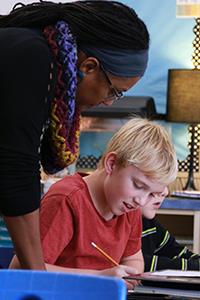Page Navigation
- Special Education Home
- Special Education Eligibility and Identification
-
Programs & Services
- Autism Behavior Learning Environment (ABLE)
- Behavior Intervention (BI)
- Comprehensive Intervention (CI)
- Deaf/Hard of Hearing Services
- Designed Instruction (DI)
- Early Learning
- Home Hospital and Homebound
- Related Services (Speech, OT, and PT)
- Resource Programs
- Secondary Transition
- Social Pragmatic
- Vision Services
- Parent Involvement & Resources
- Spokane Public Schools
- Programs & Services
Programs & Services
-
Spokane Public Schools is committed to the principle of providing education in the least restrictive environment and offers a wide variety of programs to serve all students. We believe that every student is unique and may have diverse learning needs.
These programs ensure that all students have access to a quality education tailored to their specific requirements. By offering such a diverse range of options, Spokane Public Schools strives to create an inclusive and supportive environment that promotes the academic success and personal growth of every student.
Information on our special education programs and related services can be found on the link to the left (desktop) or above using the dropdown (mobile).


